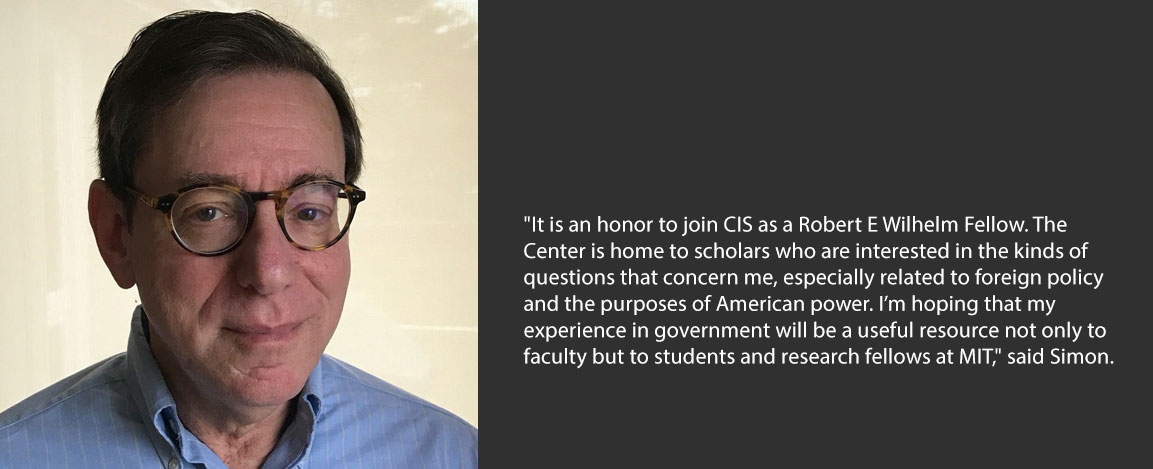Simon, who held senior positions in both the Obama and Clinton administrations, will use his time at MIT to reflect on US foreign policy, including the war on terror, Middle East relations, and the end of imperialism.
Steven Simon joins the Center for International Studies (CIS) as its Robert E Wilhelm Fellow following a prolific career in government, private industry, and academia.
Simon served as the National Security Council (NSC) senior director for the Middle East and North Africa during the Obama Administration and as the NSC senior director for counterterrorism in the Clinton White House. These assignments followed a fifteen-year career at the US Department of State.
Between government assignments, he was a principal and senior advisor to Good Harbor LLC in Abu Dhabi and director of the Middle East office of the International Institute for Strategic Studies in Manama. He managed security-related projects at the RAND Corporation and was the Hasib Sabbagh Senior Fellow for Middle Eastern Studies at the Council on Foreign Relations.
His academic appointments include: the John J McCloy ’16 Professor of History at Amherst College, lecturer in government at Dartmouth College, and most recently as Professor in the Practice of International Relations at Colby College. He has had fellowships at Brown University, Oxford University, and the American Academy in Berlin.
He will continue his work as a non-resident senior research analyst with the Quincy Institute for Responsible Statecraft, a think tank in Washington, DC.
“We are delighted to welcome Steven Simon to our community. He is not only a scholar of great intellect and breadth, but, in the tradition of the Wilhelm fellowship, one who also brings his considerable policy experience to the matters that most concern us,” said Richard Samuels, Ford International Professor of Political Science and director of CIS.
During Simon’s time at MIT, he will be writing a monograph on the history of US-Middle East relations from 1979 to the present, embarking on a project related to the liquidation of imperial commitments, and exploring the effects of the war on terror on the United States.
"It is an honor to join CIS as a Robert E Wilhelm Fellow. The Center is home to scholars who are interested in the kinds of questions that concern me, especially related to foreign policy and the purposes of American power. I’m hoping that my experience in government will be a useful resource not only to faculty but to students and research fellows at MIT," said Simon.
Simon is the co-author of The Age of Sacred Terror (Random House, 2004), winner of the Arthur C. Ross Award for best book in international relations and of The Next Attack (Henry Holt, 2006), a finalist for the Lionel Gelber Prize, and one of the “best books of the year” in the Washington Post and Financial Times, which focused on the US response to 9/11. He also co-authored Iraq at the Crossroads: State and Society in the Shadow of Regime Change (Oxford, 2003); Building a Successful Palestinian State and The Arc: A Formal Structure for a Palestinian State (RAND 2005); The Sixth Crisis (Oxford, 2010); The Pragmatic Superpower: The United States and the Middle East in the Cold War (W.W. Norton, 2016); Our Separate Ways (Public Affairs, 2016); and The Long Goodbye: The United States and the Middle East from the Islamic Revolution to the Arab Spring (Penguin/ Random House, forthcoming in 2022).
About the Robert E Wilhelm Fellowship
A generous gift from Robert E Wilhelm supports the Center's Wilhelm fellowship. The fellowship is awarded to individuals who have held senior positions in public life and is open, for example, to heads of non-profit agencies, senior officials at the State Department or other government agencies, including ambassadors, or senior officials from the UN or other multilateral agencies. Previous Wilhelm Fellows include: Hala Al Dosari, a Saudi scholar and activist; Admiral Scott Swift; the Honorable James E Baker, former chief judge of the US Court of Appeals for the Armed Forces; Lourdes Melgar, Mexico's former deputy secretary of energy for hydrocarbons; Paul Heer, former national intelligence officer for East Asia; Joel Brenner, former NSA inspector general; Abbas Maleki, Iran’s deputy foreign minister from 1988 to 1997; Ambassador Barbara Bodine; Admiral William Fallon; Naomi Chazan, an Israeli academic, activist, and politician; and Yukio Okamoto, a special advisor to the prime minister of Japan.



